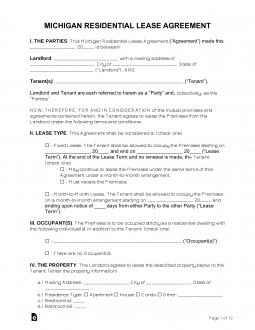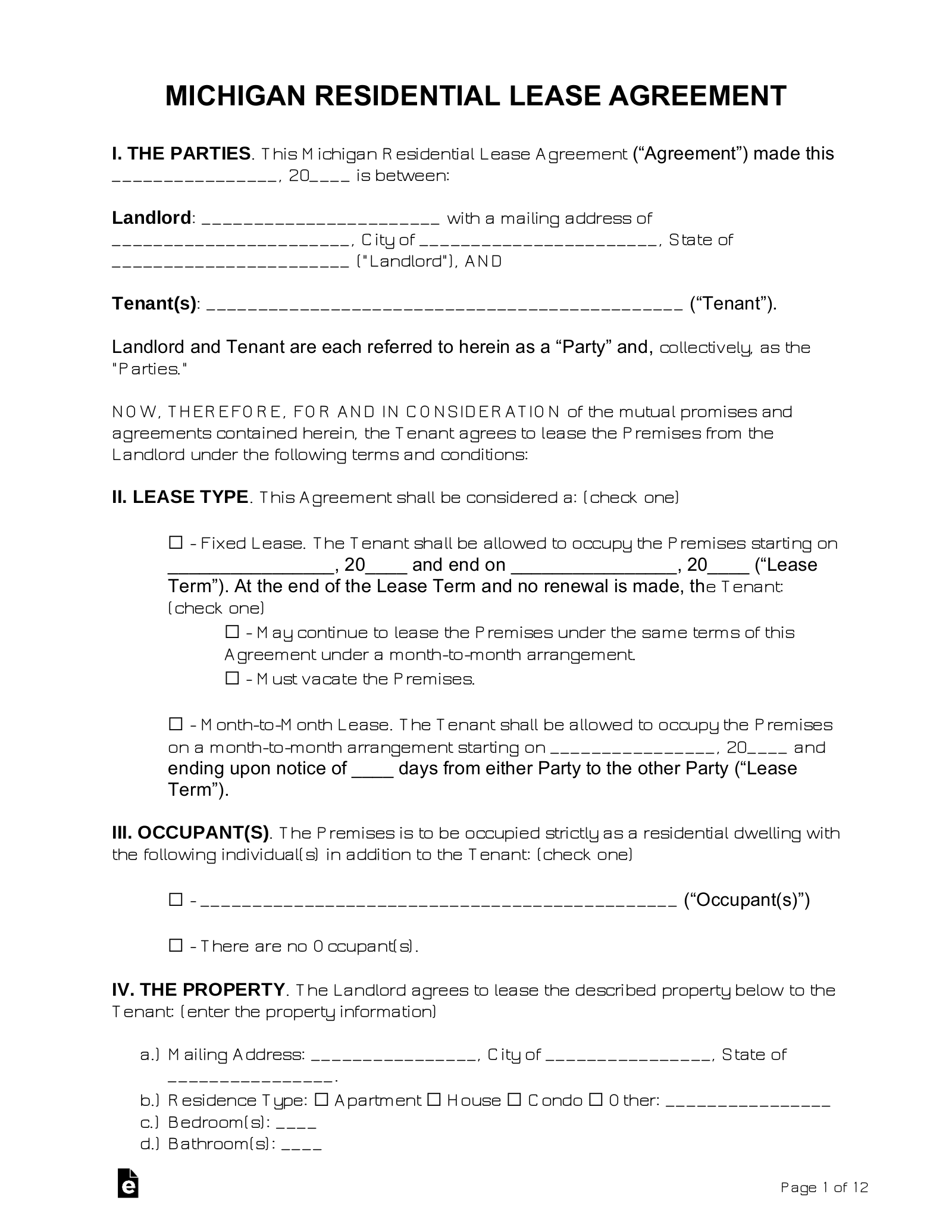Updated November 30, 2023
A Michigan lease agreement allows a landlord to lease their property to a tenant seeking to pay rent to occupy the space. The terms may vary, but commonly a standard lease is for one year, with rent due on the first of each month. It is recommended that landlords always screen their tenants to ensure they have the financial capability to pay rent on a monthly basis.
Table of Contents |
Agreement Types (7)
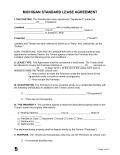 Standard Residential Lease Agreement – Residential arrangement with a start and end date for most common types of tenancies. Standard Residential Lease Agreement – Residential arrangement with a start and end date for most common types of tenancies.
Download: PDF, Microsoft Word, OpenDocument |
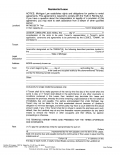 Association of Realtors Lease Agreement – To be used by realtors when representing a landlord or tenant in a rental arrangement. Association of Realtors Lease Agreement – To be used by realtors when representing a landlord or tenant in a rental arrangement.
Download: PDF |
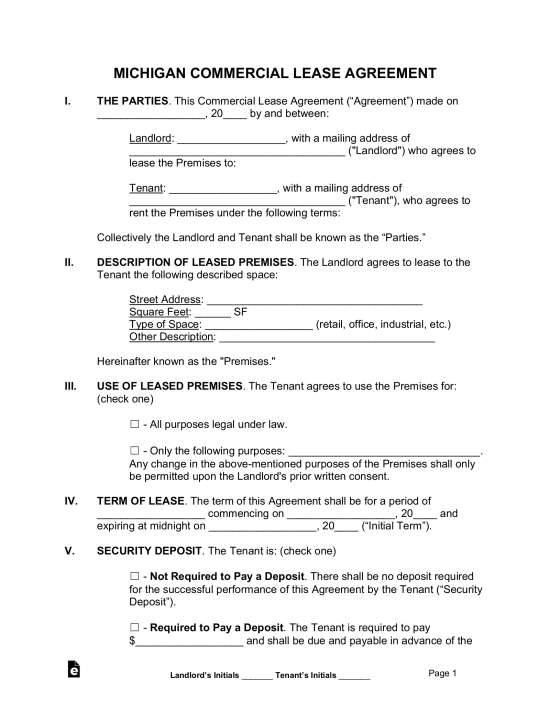 Commercial Lease Agreement – For a business use such as a store, restaurant, office, industrial, or any other type. Commercial Lease Agreement – For a business use such as a store, restaurant, office, industrial, or any other type.
Download: PDF, MS Word, OpenDocument |
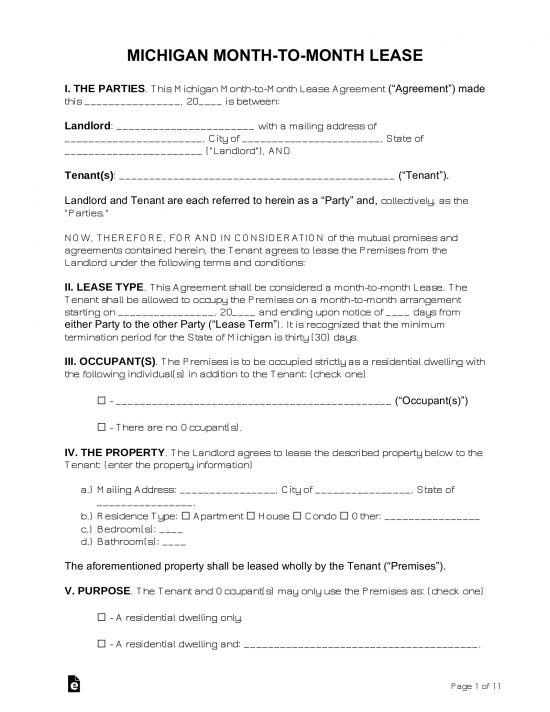 Month-to-Month Lease Agreement – A tenancy at will in accordance with § 554.134. The contract may be terminated within one month’s notice. Month-to-Month Lease Agreement – A tenancy at will in accordance with § 554.134. The contract may be terminated within one month’s notice.
Download: PDF, MS Word, OpenDocument |
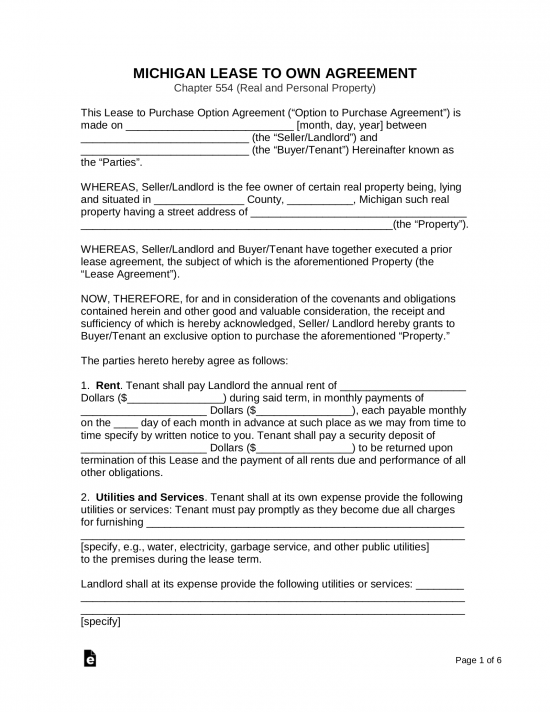 Rent-to-Own Lease Agreement – Standard contract with a provision that allows for the sale of the premises within a particular timeline. Rent-to-Own Lease Agreement – Standard contract with a provision that allows for the sale of the premises within a particular timeline.
Download: PDF, MS Word, OpenDocument |
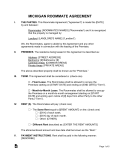 Room Rental (Roommate) Agreement – Shared housing between members of a dwelling to negotiate the services in the unit and times for cleaning and other duties. Room Rental (Roommate) Agreement – Shared housing between members of a dwelling to negotiate the services in the unit and times for cleaning and other duties.
Download: PDF |
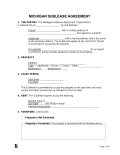 Sublease Agreement – For a tenant in a standard lease who wants to rent the property to someone else for the remainder of their term. Typically, the landlord must agree to this type of tenancy. Sublease Agreement – For a tenant in a standard lease who wants to rent the property to someone else for the remainder of their term. Typically, the landlord must agree to this type of tenancy.
Download: PDF |
Required Disclosures (6)
- Domestic Violence Victims – The landlord must disclose, either in the lease, on a notice posted in their office, or in a written notice to the tenant, that a tenant under threat of domestic violence, sexual assault, or stalking may have statutory rights to terminate their lease. Michigan law requires this notice to contain a specific phrase.
- Inventory Checklist – The landlord must provide the tenant with an inventory checklist at the beginning and end of occupancy. The tenant must use this checklist to review the condition of the property and return the list to the landlord within seven days.[1]
- Lead-Based Paint Disclosure – Federal law requires all landlords to disclose to their tenants, if the residential unit was built before 1978, that the existence of lead-based paint may pose a danger if exposed.
- Notice Information – The landlord must provide in the lease an address where the tenant may be able to send legal notices.[2]
- Truth in Renting Act – The lease must also contain a specific phrase, written in 12-point font and no less than 1/8 inch in height, establishing that the rental agreement must comply with the Truth in Renting Act.[3]
- Security Deposit Receipt – The landlord must provide the tenant with a receipt for their security deposit, which must include the financial institution where the funds are located and a specific statement disclosing that the tenant must provide the landlord with a forwarding address within four days of vacating the property.[4]
Security Deposits
Maximum Amount – The landlord cannot require a security deposit greater than one and a half months’ rent.[5]
Collecting Interest – The landlord is not required to hold the security deposit in an interest-bearing account. However, Michigan state law does require that it be deposited in a regulated financial institution.[6]
Receipt – The landlord must provide the tenant with a receipt for their security deposit within 14 days. This receipt must include the name and address of the institution holding the deposit and inform the tenant of their obligation to provide the landlord with a forwarding address no later than four days after the end of their lease.[4]
Returning – The landlord must return the security deposit, minus any amounts used to cover the costs of damages or unpaid rent, to the tenant within 30 days of the end of occupancy.[7]
- Itemized List – If the landlord uses any amount of the security deposit to pay for repairs to the property, they must provide the tenant with an itemized list of damages that includes the estimated costs of repairs.[7]
When is Rent Due?
Grace Period – Michigan state law does not establish a rent grace period. Rent must be paid on the due date specified in the lease agreement. If rent is late, the landlord can send the tenant a seven-day notice to quit to begin formal eviction proceedings.
Maximum Late Fee – There is no statutory limit on late fees in Michigan. The landlord may charge as much as desired.
NSF Fee – $25 is the maximum allowable charge for a bad check.[8]
Withholding Rent – If the landlord has been notified of the need for repairs to the unit and has failed to make the repairs, then the tenant may withhold rent and either deposit it into an escrow account or pay for the repair and deduct the cost from the rent.[9]
Right to Enter (Landlord)
There is no Michigan state law regarding a landlord’s right to access the property. However, in non-emergency situations, it is recommended that the landlord give the tenant 24 to 48 hours’ written notice.
Abandonment
Absence – Michigan state law does not establish a set number of days that a tenant must be absent for a unit to be considered abandoned. However, the law does permit the landlord to evict a tenant if the rent has not been paid and they believe “in good faith” that the tenant has abandoned the property.[10]
Breaking the Lease – The tenant may terminate the lease if they or their child are in present danger of domestic violence, sexual assault, or stalking.[11] A tenant who has lived in a unit for at least 13 months may also terminate their lease if they become eligible for subsidized senior citizen housing or can no longer live independently.[12]
Tenant’s Utility Shutoff – If the tenant’s failure to pay for essential utilities creates a serious health hazard or causes extensive damage to the property, then the landlord may give seven days’ notice to vacate.[13]
Unclaimed Property – Michigan state law does not require a landlord to store a former tenant’s abandoned personal property or to attempt to contact the tenant about said property.

